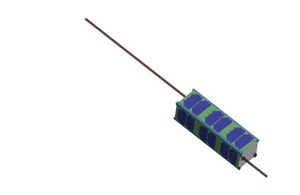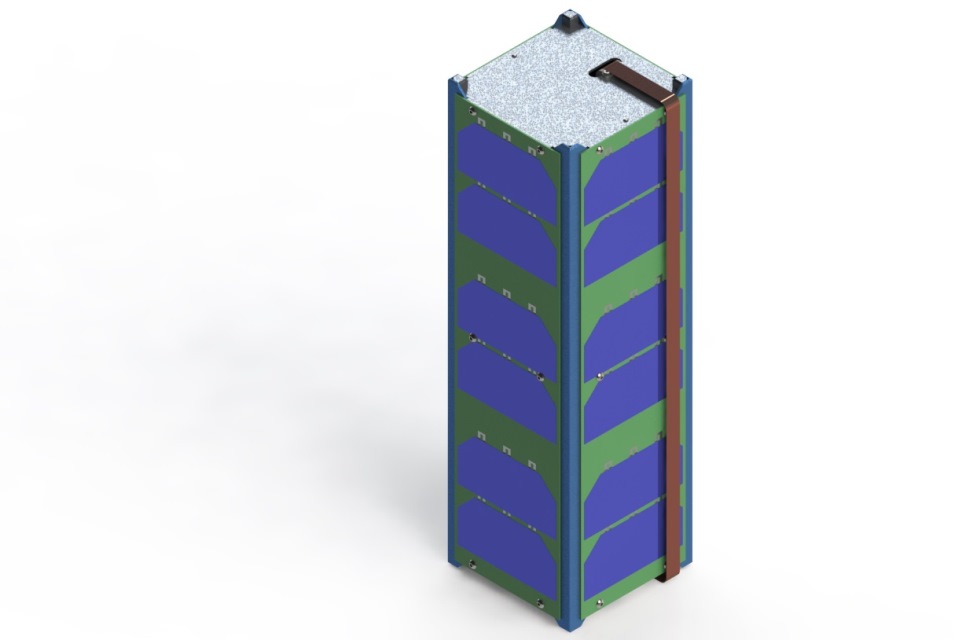UK Space Agency’s second CubeSat mission is taking shape
The UK Space Agency’s next CubeSat mission, AlSat Nano, is starting to take shape, following the selection of the mission’s payloads.

CAD drawing of Alsat Nano. Credit: Surrey Space Centre.
The suite of 3 payloads will be developed by UK academic-industrial partnerships that will use the mission for rapid and cost-effective demonstration of new and innovative space technologies.
AlSat Nano is a joint space mission between the UK Space Agency and Algerian Space Agency (ASAL). In March 2014 the UK Space Agency and ASAL signed a Memorandum of Understanding (MoU) under which the two parties agreed to enhance collaboration in space programmes. A specific action identified following the MoU was the establishment of a joint educational CubeSat development programme to be delivered by Surrey Space Centre (SSC), utilising its ties and heritage in the field.

CAD drawing of Alsat Nano. Credit: Surrey Space Centre.
The mission’s payloads include:
SpaceMag-PV Boom
This payload could significantly improve the range of science experiments that a CubeSat could carry by making advances in the field of booms – arms used to hold instrument sensors as far as possible from the spacecraft body to minimise interference. SpaceMag-PV Boom will flight test the world’s longest retractable CubeSat-compatible boom which will be able to deploy up to 2 metres in length from a volume the size of a cigarette packet. This technology could also form the basis of de-orbit systems for future missions.
The payload also carries a magnetometer, one of the most compact of its class, to carry out measurements of the Earth’s magnetic field. Also on the payload will be RadFET radiation monitors, and test tokens of a revolutionary flexible solar cell material. The payload is led by Oxford Space Systems Ltd, collaborating with partners including the Science and Technology Facilities Councils RAL Space and Bartington Instruments Ltd.
C3D2
C3D2 is a highly customisable CubeSat camera offering three fields of view and innovative on-board software processing capabilities. The payload will also be a remote experiment of the Open Science Laboratory - an award-winning suite of remote experiments that supports distance learning students studying science and engineering. C3D2 will offer these students the chance to operate a real payload on an orbiting spacecraft. The payload development is led by the Open University Centre for Electronic Imaging with sensor hardware provided by e2v Ltd and electronics from XCAM Ltd.
Thin Film Solar Cell
Thin Film Solar Cell is a novel and potentially step-changing solar cell structure which is directly deposited on cover glass just 1/10th of a millimeter thick. Effects from the space environment will be measured, with the aim of allowing the organisations involved a route to product development and commercial exploitation of this technology. This project is led by the Glyndwr University Centre for Solar Energy Research with contributions from the University of Surrey, Qioptiq Ltd and Surrey Satellite Technology Ltd.
Dr David Parker, Chief Executive of the UK Space Agency, said:
AlSat Nano is really starting to take shape. This collaborative programme with our Algerian partner demonstrates the UK’s open and collaborative approach to international space projects, especially in the innovative and fast moving field of CubeSats.
These tiny spacecraft are helping ever more organisations to get involved in satellite technology, develop skills and drive innovation.
AlSat Nano will be designed, built and launched as part of an education programme SSC will deliver to Algerian students. The UK Space Agency is funding SSC to design and build the platform hardware and software, and ASAL will undertake the final assembly and testing, launch and operations with expert guidance from SSC. As part of the mission, approximately 1 unit of the AlSat Nano platform has been made available to host self-funded payloads from the UK CubeSat community as a free flight opportunity. Launch is aimed for mid-2016.
The global CubeSat sector is predicted to grow exponentially in the coming years, fuelled by the availability of commercial off-the-shelf components, sub-systems and support systems which significantly lower the barriers to entry for emerging nations, government departments, universities and entrepreneurs. UK space industry and academia has significant capability in the CubeSat sector and AlSat Nano will help keep the UK at the forefront of the design, development and commercialisation of technologies into this supply chain.